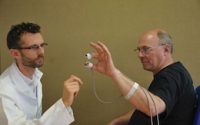A better way to monitor People with Parkinson’s using “white box” AI
- Date
- 19 Mar 2024
- Start time
- 7:00 PM
- Venue
- Tempest Anderson Hall
- Speaker
- Professor Stephen Smith, School of Physics, Engineering and Technology at the University of York.

A better way to monitor People with Parkinson’s using “white box” AI
Professor Stephen Smith, School of Physics, Engineering and Technology at the University of York
Synopsis: Parkinson’s is a common, debilitating condition for which there is currently no cure. However, digitising people’s movements and analysing the resulting data can lead to a more effective medication regime and help identify repurposed drugs that may slow or even halt the progression of Parkinson’s. This talk will introduce the interpretable “white box” machine learning algorithms developed to analyse the data and the resulting medical devices.
Image: Creative Commons
7pm in the Tempest Anderson Lecture Theatre in the Yorkshire Museum
All Welcome. This is a free event although donations are also welcome.
Member’s report:
Parkinson’s is a common debilitating condition with 127,000 people in the UK having a diagnosis. Many of its symptoms are shared with other conditions and it is estimated that 25% of Parkinson’s diagnoses are erroneous. This is a serious problem as the medication for Parkinson’s is very different to that required for the other conditions leading to poor outcomes and unwanted side effects. Steve’s work over thirty years has concentrated on using sensors on patients’ hands to monitor finger and thumb movements. These position, speed and acceleration data can be interpreted by machine learning algorithms which can be trained to recognise Parkinson’s symptoms and distinguish them from other conditions. Early implementations of these AI techniques used so called “black box” algorithms in which the process applied to the data to get a result cannot be tracked. Steve has been using recently developed “white box” algorithms which allow their processing to be monitored. This is essential in a clinical environment where medical regulators require such transparency in the data processing. The biggest cost to the NHS of Parkinson’s is unplanned hospital admissions very often due to falls caused by impaired mobility associated with difficulties in controlling medication dosage. Steve’s work with motion monitoring can also help here helping clinicians with better decision making.
Andy Marvin.